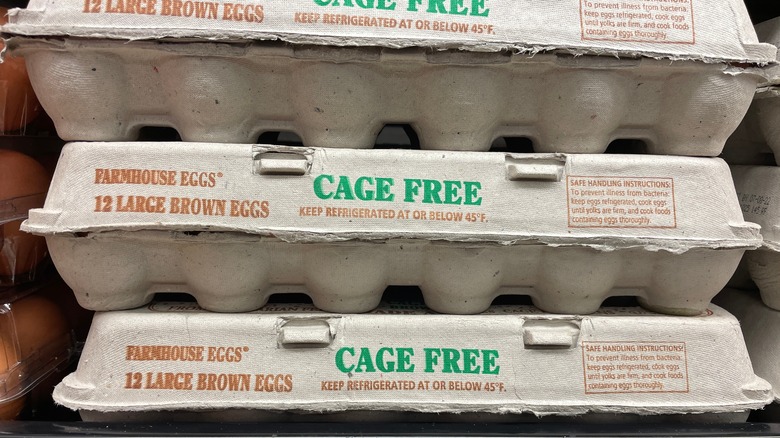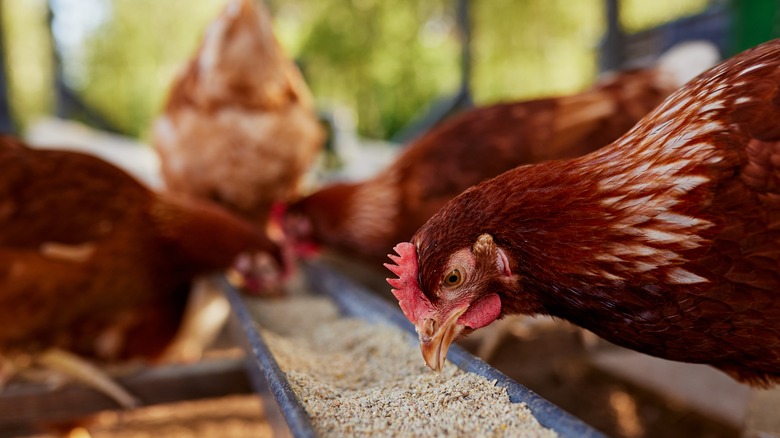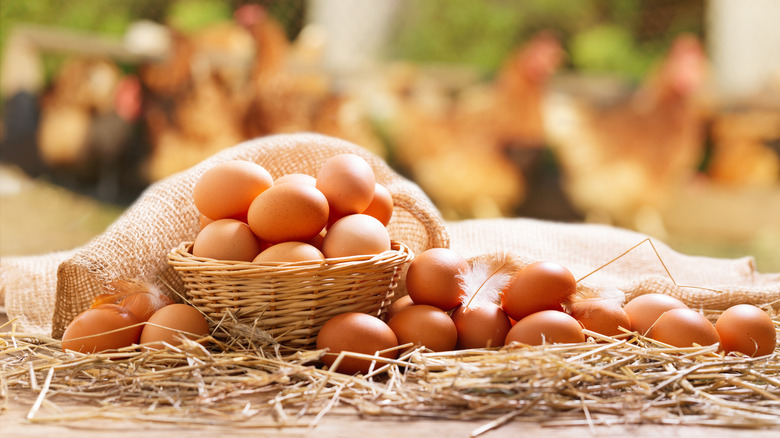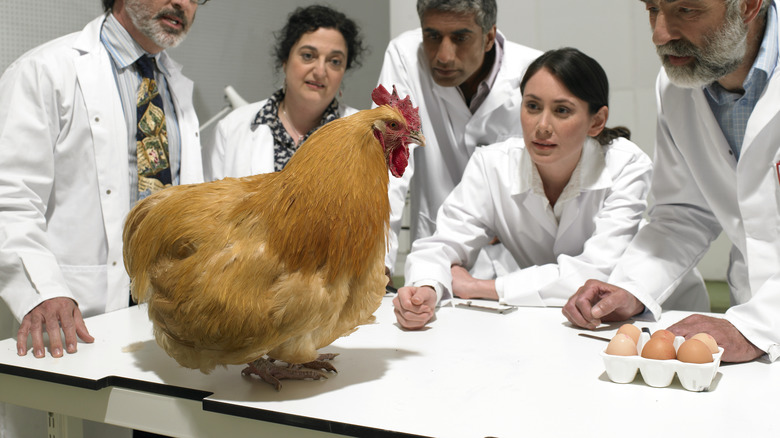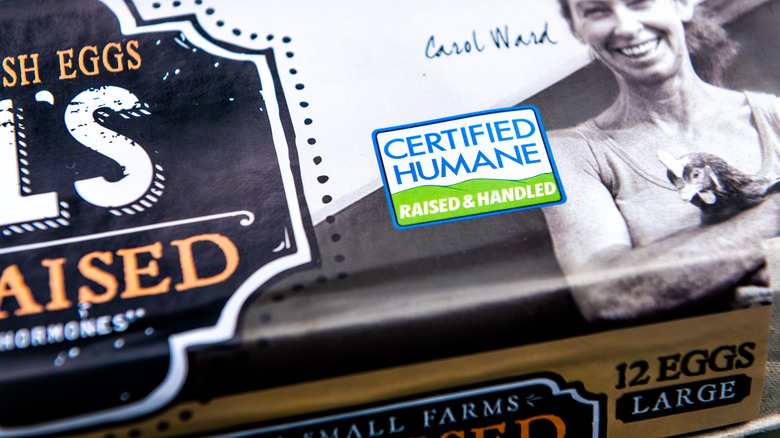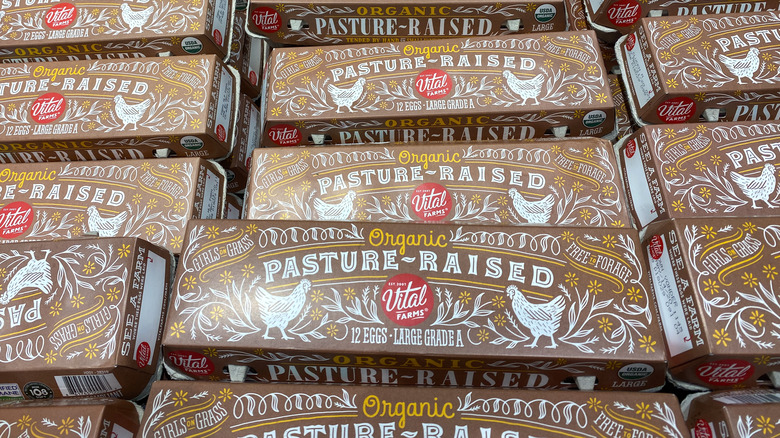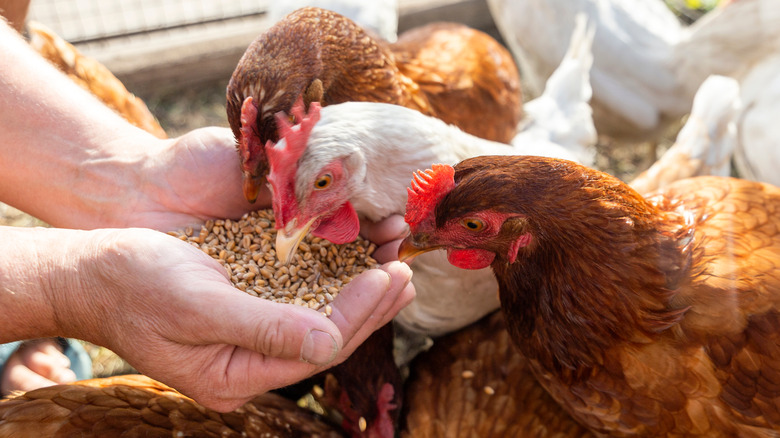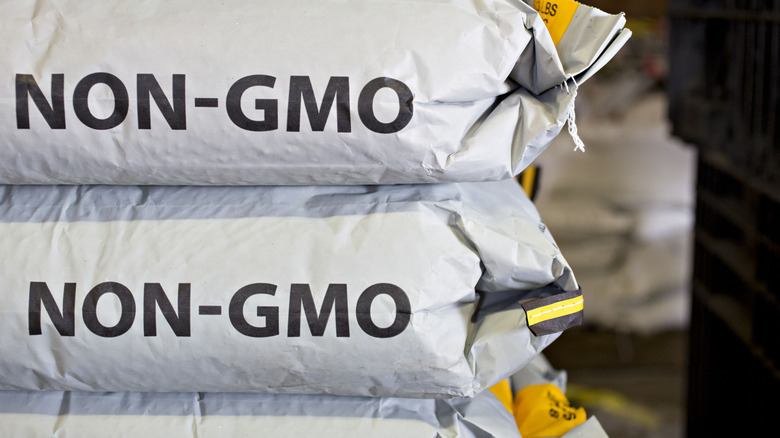14 Confusing Egg Carton Labels, Explained
It might seem like food labeling is becoming more convoluted. This isn't necessarily a bad thing, as it usually indicates enforcement of higher food quality and animal welfare standards — along with better transparency from producers.
You don't have to be vegan or vegetarian to be considerate about where your animal-based food products come from, but it can be tricky determining the specific meanings of individual labels. To make matters more confusing, we also have to differentiate between which labels are official certifications, which are third-party accreditations, and which are simply marketing terms — while not untrue, they are effectively meaningless.
Let's take a look at the most commonly used egg carton labels that might be a little perplexing, uncover their true meanings, and help you decide whether they should inform your purchasing decision. We'll base the definitions on United States food regulations, so while some of the information still applies in other countries, the specifics may vary.
Cage-free
Traditionally, hens used for large-scale egg production are kept in what's known as battery cages. The size of these wire-frame cages varies, but they're generally extremely cramped conditions with little space for the hens to move freely, and most people would consider this type of housing inhumane.
Egg cartons bearing the cage-free label indicate that the egg-laying hens aren't kept in battery cages, implying a better quality of life for the animals. However, while "cage-free" is a term regulated by the United States Department of Agriculture (USDA), it doesn't necessarily mean the hens are well-cared for. According to the USDA, "cage-free eggs must be produced by hens housed in a way that allows for not only unlimited access to food and water, but, unlike eggs from caged hens, also provides them the freedom to roam during the laying cycle."
Unfortunately, this definition doesn't guarantee the hens have access to outdoor spaces, and although the idea of giving the animals more space to roam sounds better in practice, they may be more susceptible to disease as more birds are sharing a single space, and there's a higher risk of the animals fighting each other, or even resorting to cannibalism.
Free range
Eggs in cartons labeled as "free range" bear some similarities with cage-free eggs but with one major difference. Also, a designation that's regulated by the USDA, free range eggs "must be produced by hens that are able to roam vertically and horizontally in indoor houses, and have access to fresh food and water, and continuous access to the outdoors during their laying cycle."
On paper, this sounds like a much more ethical choice but the truth isn't so straightforward. While giving the hens outdoor access is certainly preferable, there aren't set guidelines for exactly how much outdoor space they're given, the quality of that space, or how much time they can spend there.
Some additional certifications do set specific standards — but it's hard to argue that the free-range label is a 100% guarantee that the eggs you're buying have been laid by hens living in excellent conditions, just because they spend some of their time outdoors. Plus, we can still run into the same issues that non-battery hens experience in terms of disease and violence, as well as the risk of predators or extreme weather.
Farm fresh
The "farm fresh" label is used to suggest the eggs you're about to buy have been produced relatively recently and come directly from a farm. After all, the imagery of freshly laid farm eggs is much more palatable than one of sickly hens in cramped, factory-like conditions.
Whereas some labels on your egg carton can only be present if the product meets certain regulations, others have no such restrictions, with "farm fresh" being one of them. It's essentially just a marketing term that any producer can slap on their egg boxes to draw in customers. In some cases, the label may mean the eggs were genuinely sourced from a local farm and have been freshly laid, but without further digging, there's no way to tell.
Going back to the USDA's list of definitions, "A farm is defined as any place from which $1,000 or more of agricultural products were produced and sold, or normally would have been sold, during the year." There's nothing in that statement relating to farming standards or the treatment of their livestock.
All-natural
In food production, the definition of "natural" is a bit of a tricky one to pin down; after all, anything that occurs in nature could be considered natural, even with human input. For argument's sake, in this case, let's assume we're excluding artificial or "man-made" products that have been heavily processed.
While we're making excellent strides in developing ethical, lab-grown meat products, there's nothing out there resembling an artificial or "unnatural" egg, so what does the label mean if it's present on an egg carton? Well, not much. Going back to the USDA, natural "is a product containing no artificial ingredient or added color and is only minimally processed."
If that's the official criteria, then technically all eggs are natural, so again, we're looking at an unregulated marketing term that egg producers use to entice consumers with the idea of a healthier, unadulterated product. The "all-natural" label has no relation to the supplier's farming practices, production methods, or animal welfare, so it shouldn't be used to inform your purchasing decision.
No hormones
As the human population continues to grow at an exponential rate, the demand for food has also increased, putting pressure on the agriculture industry to find ways to increase their yields. One of the ways to do this has been to use hormones and steroids to promote animal growth, quicken their reproductive cycles, and reduce the amount of feed needed to increase size and muscle mass.
However, in most developed countries, including the United States, it's almost completely illegal to give hormones to livestock. There are some exceptions within the beef cattle industry, but their use here is still very highly regulated, and there's a total ban on giving hormones to poultry. In the European Union, even the cattle industry is not exempt from the prohibition of using hormones and steroids.
So, while the "no hormones" label might bring consumers some level of comfort in knowing their eggs aren't coming from hormone-injected hens, it's completely unnecessary, as the risk is non-existent in the first place.
No antibiotics
The nature of large-scale agricultural production or factory farming means animals are generally raised in cramped and crowded environments that are the perfect breeding ground for bacteria. To mitigate the risk of disease outbreaks among their stock, it's not uncommon for farmers to use antibiotics to keep their animals healthy for as long as necessary.
There's good reason to be wary of antibiotic usage in farming too. Over time, bacteria become resistant to repeated doses of antibiotics, meaning they can evolve to a point where our current treatments are ineffective. From a public health perspective, this could have hugely damaging outcomes in the long term.
As a result, the administration of antibiotics is also strongly regulated. Treated animal products must go through a waiting period before they can be sold to ensure there are no traces of the antibiotics before anyone can buy them. The nature of the regulations means if a farmer has to use antibiotics on their hens, they'd need to throw away any eggs laid in a certain period, so the chance of you encountering an egg laid by a hen with antibiotics in its system is close to zero, regardless of the label.
Organic
The term "organic" is another one that consumers have good reason to be wary of, considering its definition can vary from place to place and product to product. Fortunately, apart from exceptions made for smaller operations, the USDA does regulate the "organic" label when it comes to eggs.
Specifically, the eggs must "come from uncaged hens that are free to roam in their houses and have access to the outdoors. The hens are fed an organic diet of feed produced without conventional pesticides or fertilizers." In general, these are all positive criteria; however, we've already covered the fact that these definitions can be relatively loose.
It also shouldn't be assumed that every part of organic farming processes is without its drawbacks, as non-synthetic pesticides and fertilizers aren't necessarily less harmful than synthetic ones, and organic farming can be more resource, land, and labor intensive. That being said, if you prefer organic eggs, you can trust that a USDA certification on the carton guarantees a certain level of oversight and quality.
Brown or white
So a carton that says brown or white eggs on the front might not be too confusing — the eggs inside are going to be brown or white — but you might wonder what the difference is. Practically speaking, brown hens lay brown eggs, and white hens lay white eggs.
As for the nutritional differences between the two, scientists have discovered that there doesn't seem to be any real variation. But why are brown eggs usually more expensive than white ones if you're not paying for a better flavor or more health benefits. Ultimately, this comes down to the simple fact that brown egg-laying hens generally require more energy for egg-laying. This means they need more feed which comes at an additional cost that's passed on to the consumer.
Although the color of an egg's shell has no impact on the nutritional value of its contents, that doesn't mean there aren't other factors that do, like the quality of life and diet of the chicken.
Omega-3
Without diving too deeply into the nitty gritty of Omega-3 fatty acids, it's suffice to say that they're a type of fat essential for our bodies to function properly. It's also not something we can produce on our own, so we have to obtain it through our diets.
Now, eggs are already rich in Omega-3, with the average egg containing around 70 milligrams of the fat, so an Omega-3 label on an egg carton may be redundant. However, it's not unusual for some farms to supplement their chicken feed with Omega-3 to enrich the eggs to increase the health benefits for the consumer. Often, this is done by adding flaxseeds, chia seeds, or certain plant-based oils.
Like most supplements, it's possible to have too much of a good thing, both for chickens and humans. However, if you're looking to maintain a healthy heart and brain by increasing your Omega-3 intake, choosing eggs from hens with an enriched diet isn't a bad place to start.
Certified Humane/Animal Welfare Approved
Aside from USDA-approved labels, you might spot a few other official-looking certification labels on an egg carton. Most commonly, these would be Certified Humane or American Humane Certified.
These are two of the most well-recognized third-party organizations that offer accreditation labels to egg producers that meet their own specific sets of animal welfare standards. Farms can request auditing from one of these organizations who will use their own guidelines to decide whether the producer meets the correct criteria for accreditation. While the guidelines could still be considered somewhat subjective, the required standards for certification are arguably higher than those of the USDA.
Certified Humane have demonstrated that the USDA Organic label calls for far lower standards than its own, not going far enough to protect animal welfare or the environment. They also argue that the USDA certification is cost prohibitive to smaller operations, meaning organic farms may be missing out on the accreditation they deserve.
Pasture-raised
After cage-free and free-range, pasture-raised is effectively the best designation related to egg-laying hens' welfare conditions. Typically, the birds have much greater access to the outdoors, more personal space, and the opportunity to behave somewhat more naturally, which includes the ability to forage for plants, seeds, and insects to supplement their diet.
However, unlike cage-free and free-range labels, pasture-raised isn't regulated by a specific set of national standards dictated by the USDA. This isn't terrible news, as many still consider USDA standards to be below where they should be. Third-party accreditors, however, will back the claim based on their own inspections, so if you see a pasture-raised label in conjunction with a Certified Humane or Animal Welfare Approved certification, you can be assured the higher welfare standards are being met. There's also some evidence that pasture-raised eggs are more nutritious, with their improved diet and lifestyle causing a striking increase in their Omega-3 and vitamin levels (via Penn State).
Pesticide-free
To this day, the debate rages on about the necessity of pesticides for maintaining a global food supply for a growing population. The science shows that there are clear negative impacts on human health and the environment, but it also claims we should weigh those drawbacks against being able to have diets of fresh fruit and vegetables.
Some organic farming methods use organic or non-synthetic pesticides instead, but these aren't necessarily better for the environment in the long term, especially if used in large quantities. A pesticide-free label on an egg carton means the hen's feed hasn't been grown using pesticides, so this might be appealing if you fall into the pesticide-free camp. That being said, just because the feed is pesticide-free, that doesn't really tell us anything about the quality of the feed itself.
If you want to be sure the chickens are being fed on a diet that's both nutritious and pesticide-free, you'll also want to keep an eye out for one of those reputable third-party certifications.
Vegetarian-fed
A label saying "vegetarian-fed" is relatively self-explanatory and means the chickens have been fed a vegetarian-only diet. At first glance, this might sound pretty desirable, especially given the industrial farming industry's reputation for providing questionable feed.
However, regardless of your personal views on vegetarianism, chickens are omnivores, meaning they require a mixed diet that includes plants, insects, and animals. By forcing the hens onto a vegetarian-only diet, they become deficient in an important protein-based amino acid called methionine. Without giving them a supplement that would negate any "organic" status, the birds can become sick, or even start pecking at each other in search of their missing nutrients.
Fortunately, the chickens can get methionine through foraging for insects and small rodents, which they can do if they have enough outdoor space for roaming. So, despite the appeal of the vegetarian-fed label, pasture-raised is a better choice if you've got the animal's welfare in mind.
Non-GMO
GMO stands for Genetically Modified Organism, which is a plant or animal whose DNA has been genetically engineered for a specific purpose. Eggs are already GMO-free, so if an egg carton bears the "non-GMO" label, it's typically referring to the chickens' feed.
The term GMO has become a bit of a boogeyman in the health-conscious and organic-lifestyle communities, but the fact is humans have been using selective reproduction in agriculture for centuries to improve flavors, increase yields, and create more resistant crops. While studies into the impacts of GMO foods are still ongoing, current evidence shows no detriments to human health. There are some concerns regarding antibiotic resistance or genetic crossover into wild populations, but these are still considered minimal compared to the potential benefits.
The vast majority of staple crops grown in the United States — corn and soy, for instance — are GMO, so there's a very strong likelihood the chickens you're getting your eggs from are on a GMO diet unless the carton specifically says otherwise. If a non-GMO is important to you, you'll want to make sure this label is present.


